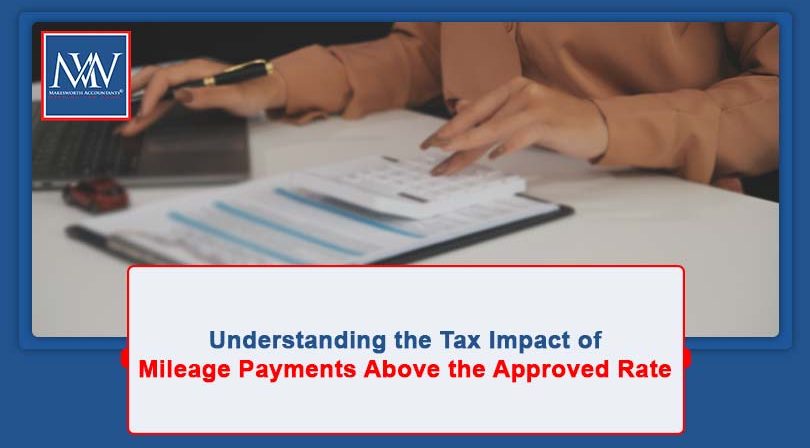
Understanding the Tax Impact of Mileage Payments Above the Approved Rate
Introduction
Many employees use their vehicles for business-related travel and receive mileage payments from their employers to cover expenses like fuel, insurance, and vehicle wear and tear. However, the tax-free amount an employer can provide is regulated by the Approved Mileage Allowance Payments (AMAPs) scheme. It is important to note that this scheme does not apply to employees who drive company cars.
How the AMAP Scheme Works
The AMAP scheme allows employers to reimburse employees tax-free for business mileage in their vehicles, up to a specified ‘approved amount.’ This amount is determined by multiplying the total business miles driven in a tax year by the government-approved mileage rates. The calculation applies to the tax year as a whole rather than on a per-trip basis.
Below are the approved mileage rates:
| Type of Vehicle | Approved Rate |
|---|---|
| Cars and Vans | 45p per mile for the first 10,000 business miles in a tax year; 25p per mile thereafter |
| Motorcycles | 24p per mile |
| Bicycles | 20p per mile |
Example
John, an employee, drives 12,000 business miles using his car within a tax year. His approved mileage amount is calculated as follows:
- 10,000 miles @ 45p per mile = £4,500
- 2,000 miles @ 25p per mile = £500
- Total approved tax-free amount: £5,000
What Happens If an Employer Pays Above the Approved Amount?
The excess becomes taxable income if an employer reimburses an employee beyond the approved amount. However, as the calculation applies to the tax year as a whole, higher per-mile payments for individual journeys may not necessarily result in taxation, provided the total annual payments remain within the approved limit.
Example
Shay drives 10,200 business miles and receives a mileage rate of 30p per mile. His final journey of the tax year is 150 miles, for which he receives £45 (150 miles @ 30p per mile). Although the approved rate for that journey is 25p per mile, his total mileage payments for the year amount to £3,060 (10,200 miles @ 30p per mile), which is below the approved tax-free threshold of £4,550 (10,000 miles @ 45p + 200 miles @ 25p). Consequently, his mileage reimbursement remains tax-free.
However, if Shay had been paid 50p per mile, his total mileage reimbursement for the year would have been £5,100, exceeding the approved amount of £4,550. In this case, the excess £550 would be subject to taxation.
What If the Employer Pays Less Than the Approved Amount?
If an employer reimburses employees at a rate lower than the approved mileage allowance, employees can claim tax relief for the difference. Similarly, if an employer does not provide mileage reimbursement, employees are entitled to claim tax relief for the full approved amount.
National Insurance Contributions (NIC) Considerations
A similar scheme applies to National Insurance calculations, but there are key differences. Instead of calculating the exemption for the entire tax year, the NIC-free allowance is determined separately for each earnings period. Additionally, for National Insurance purposes, the tax-free rate for cars and vans remains 45p per mile, regardless of the total mileage covered in the tax year.
Conclusion
Understanding how mileage payments are taxed helps employers and employees ensure compliance with tax regulations while maximizing tax-free reimbursements. Employers should carefully manage reimbursement rates to avoid unnecessary tax liabilities, while employees should be aware of their rights to claim tax relief when reimbursed below the approved rates.
References: ITEPA 2003, ss. 229 – 235; Social Security (Contributions) Regulations 2001 (SI 2001/1004), reg. 22A.
Need Accountancy Support?
For information on bespoke training, or if you have any other questions for Makesworth Accountant, please fill in your details below
















 151
151